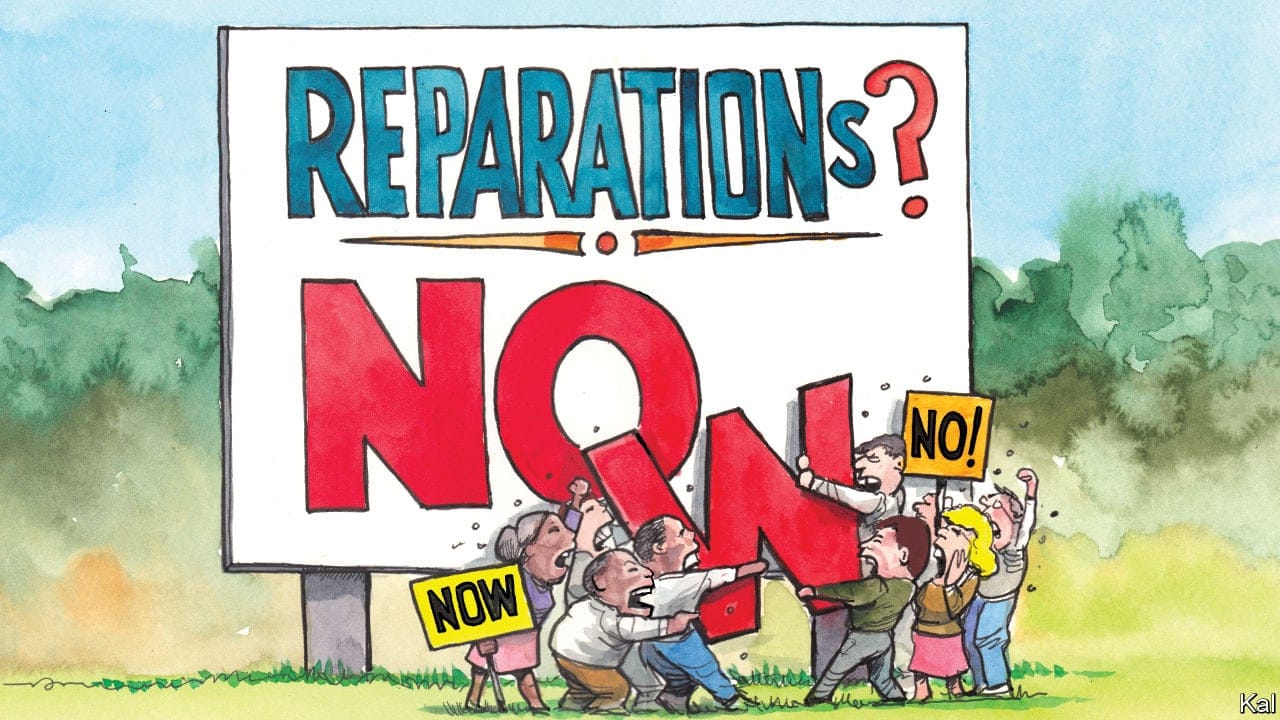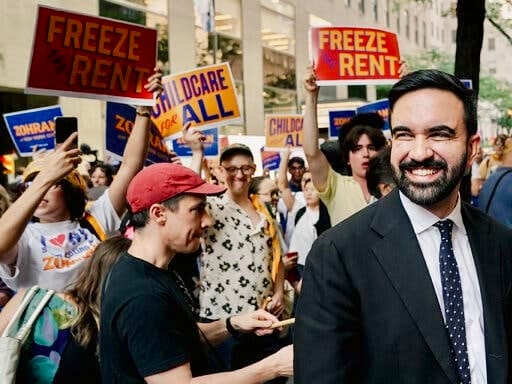Segregated Philly task force delves into reparations
A friend of mine, knowing how much I like to be helpful, asked me if I knew the PHL Reparations Task Force was looking for volunteers.

The what? It is a committee set up by City Council, saying Task Force members “must have the capacity to provide pro bono professional expertise, be excellent coordinators, and work very well with others.”
They also should have “experience in the sector of the position they are seeking to fill, and experience in activism, social justice, grassroots community organizing, or reparatory justice.”
My friend, let’s call him Larry, may have known that I have thought about reparations and have written about it a couple of times. Like here. I am open to a discussion of reparations, so I went to the website to volunteer.
That’s where I found two other requirements — you must be a resident of Philadelphia — and you must be Black. It's a segregated task force.
Well, I thought, so much for my white privilege. 😁
My thoughts got on a merry-go-round.
> How does this align with a city that has made a fetish of diversity, equity, and inclusion?
> If the task force is funded by taxpayer money, that means Philadelphians are paying to support segregation.
> Is it even legal? Could a public school, for example, exclude students of a given race?
> Since the city makes accommodations for men who identify as women, can I join the task force if I identify as Black?
> It’s not the first time the city has played this game. When seeking a sculptor to execute a statue of Harriet Tubman last year, white artists were excluded, including the one whose inspiring version of Tubman ignited the desire for such a statue in the first place.
That was as striking an example of reverse racism as you could find, but no one sued, white people shrugged and went on with their lives.
From reading the website, rep215.com, I learned the task force was not asking for people like me with expertise in communications. Or reporting.
It wanted eight coordinators:
# Economic justice
# Education
# Health and Wellness
# Atlantic World History
# Human Services and Community Resources
# Criminal and Legal Justice
# Law and Policy (International and Domestic)
# Urban Planning and Sustainable Development
Hmmm.
The rep215.com website is brimming with information, tons of it.
Before I get to Philly, I offer the reparations “wants” of the San Francisco Advisory Committee that started at $5 million per Black person, and went up from there, to include an annual "salary" of $97,000 on top of the $5 million, plus free housing and free education. No, I am not making this up.
How can you take such people seriously?
The Philly task force starts with the predictable predicate of slavery, Jim Crow, segregation, red-lining and the like.
The committee lists every conceivable piece of racial legislation from the past, but then tacks on questionable others, such as compulsory education, taxes, the war on poverty and the war on drugs. What might have been an elegant meal became a stew, with every leftover in the fridge tossed in.
The list of grievances is long and tortured, including:
> Pseudoscientific subordination to civility, humanity, and society
> Religious manipulation, spiritual duress, and iconoclasm
> Ravage adulterating and progeneritive bastardization
I know it sounds like a satire on an Advanced Placement sociology class at Princeton, but check the website for yourself. Are they sure they don’t want someone with communications skills?
> Racial antagonization and ethnic appropriation
> Asset annihilation and capital bankruptcy
> Ecological opiating and inebriation
> Accredited miseducation and authorized misinformation
> Overt vilification and unjust criminalization
> Corrupt policing and mass incarceration.
Wait! That last one might make sense. I’ll stop here.
The committee offers a long list of previous claims for reparations, almost all of which failed.
The committee named four that succeeded, but listed in a different section reparation payments made to Japanese Americans who were wrongly interned during World War II.
Reparations generally are paid to those who were actually harmed, not to their descendents.
The payments would come from (according to the website) “the churches, universities, units of government, families and family estates, and businesses who were enslavers, pillagers, ravagers, and thieves of land and property.”
Some cities and counties and universities — such as Georgetown and Princeton Theological Seminary — already have admitted benefiting from slavery and have made voluntary forms of restitution, not usually cash to individuals. The universities are offering free tuition to descendents of slaves. Seems fair.
In my opinion, cash to individuals will never fly. I can’t imagine a policy that would have my minimum-wage daughter writing a reparations check to Oprah Winfrey. America will not tolerate payments from people who were not enslavers to people who were not enslaved.
The website devotes two pages to listing what forms reparations might take, following a page of determining who might be eligible. It is like wading through oatmeal.
The “wants,” frankly, are a poorly thought-out grab bag of Social Justice Warrior issues.
Under “sustainable development,” it lists
No poverty
Zero hunger
I’ll stop here. How is no poverty and hunger “sustainable development”?
Health & Well Being
Education
Gender Equality
Clean Water and Sanitation.
Stop! What has this to do with amends for slavery?
Also on the list…
Life Below Water
Life on Land
What the hell are they talking about?
There are also headings for Social Determinants of Health, Community Development, Professional Developments & Accesses, and Personal Development.
Unlike San Francisco, which had price tags, mostly insane, Philadelphia is offering a mish-mash of words and phrases that hardly have meaning.
Reasonable people can agree Black people were held down in America, during slavery and after.
The Pulitzer Prize-winning book, “Slavery by Another Name” reports that debt slavery actually continued into the 1940s. Jim Crow, segregation, and redlining continued even longer.
Even today, some vestigial ashes of bigotry remain in America, and there is an undeniable gap between the wealth (and health) of white people and Black people.
How do we close the gap?
The most direct way is to hand out large sums of money to African-Americans.
That’s what San Francisco recommended, and that’s when progressive Gov. Gavin Newsom put on his best shit-eating grin and let them know — no, that would not happen. It would bankrupt the state, he said, even as the chant arose, “Give us the money or you don’t get our vote.”
He may not get their vote, but they will not get $5 million.
So how do you close the gap?
1- Education
Generally speaking, the educated earn more than the uneducated.
Guaranteeing a free college education to every Black person would be a good start, and not impossibly expensive.
But to succeed in college, students must first have a solid foundation in elementary and high school.
In Philadelphia, the public schools are 85% nonwhite, and they suck.
The schools need more and better teachers, aides, tutors, and innovative methods to inculcate a desire to learn. That is a tall order.
Students should also be taught financial literacy, which was one of the planks in Alan Domb’s platform when he ran for mayor. Kids have to understand money — how to accumulate it, how to borrow it, and lend it.
2- Home ownership
The main financial asset for most American families is their home. That is the foundation of wealth, and it is transferable down the generations.
Low-income African-Americans can and should be given preferential treatment by banks and mortgage companies, to offset the discriminatory treatment they received in the past. Get them into houses.
3- Tax credit
Nationally, poor people don’t pay federal income tax now, but low-income Black people could be given a special tax credit in lieu of reparations, aside from child and earned-income credits.
This is different from a cash handout. It would be a small annual stipend, maybe $3,000, paid into a 401k-type account, untouchable, let’s say, for 10 years. Think of it as a forced savings account, and another way to build generational wealth.
So, three steps:
Get them into college
Get them into homes
Get them into capitalism.
To me, it seems modest, fair, and right.



